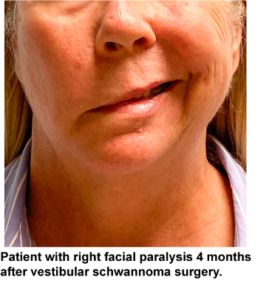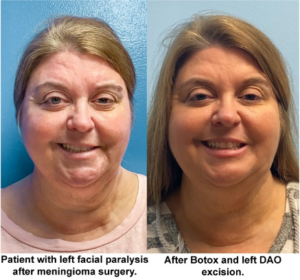Vestibular Schwannomas (aka acoustic neuromas)
What are vestibular schwannomas?
Vestibular schwannomas (aka acoustic neuromas) are common benign tumors of the vestibular nerve (aka balance nerve). Patients often present with asymmetric hearing loss, dizziness, and/or balance issues. Vestibular schwannomas are managed and treated by neurotologists (dedicated ear and skull base surgeons). Treatment options include observation, targeted radiation therapy, and surgery to remove the tumor. Other tumors such as meningiomas can also cause symptoms similar to vestibular schwannomas and may require surgery. Dr. Miller works alongside world expert Neurotologists within the Department of Otolaryngology/Head & Neck Surgery at the University of North Carolina to care for patients with vestibular schwannomas and other tumors.
present with asymmetric hearing loss, dizziness, and/or balance issues. Vestibular schwannomas are managed and treated by neurotologists (dedicated ear and skull base surgeons). Treatment options include observation, targeted radiation therapy, and surgery to remove the tumor. Other tumors such as meningiomas can also cause symptoms similar to vestibular schwannomas and may require surgery. Dr. Miller works alongside world expert Neurotologists within the Department of Otolaryngology/Head & Neck Surgery at the University of North Carolina to care for patients with vestibular schwannomas and other tumors.
Vestibular Schwannoma-Associated Facial Paralysis
Vestibular schwannomas do not usually present with facial paralysis. However, surgery and radiation therapy to treat these tumors can damage the facial nerve causing temporary, or even permanent, facial weakness. This damage occurs because the vestibular nerve runs right next to the facial nerve. Most commonly, the facial nerve remains intact during vestibular schwannoma surgery and patients wake up with normal facial function.
 Some patients wake up with facial weakness even though the nerve is intact. When this scenario happens, there is generally a 6-month observation period to allow the facial nerve to recover. During this period, Dr. Miller can perform eyelid procedures such as a platinum eyelid weight placement to maximize protection and comfort of the eye (this weight can easily be removed when patients regain the ability to blink and protect their eyes!!!). If no recovery has occurred after 6 months, Dr. Miller can perform a 5-7 Nerve Transfer Smile Reanimation procedure to restore a patient’s smile while permitting continued recovery of the native facial nerve. Other facial reanimation procedures can be performed to restore facial tone (i.e., symmetry at rest) if no facial nerve recovery is seen at 12 months.
Some patients wake up with facial weakness even though the nerve is intact. When this scenario happens, there is generally a 6-month observation period to allow the facial nerve to recover. During this period, Dr. Miller can perform eyelid procedures such as a platinum eyelid weight placement to maximize protection and comfort of the eye (this weight can easily be removed when patients regain the ability to blink and protect their eyes!!!). If no recovery has occurred after 6 months, Dr. Miller can perform a 5-7 Nerve Transfer Smile Reanimation procedure to restore a patient’s smile while permitting continued recovery of the native facial nerve. Other facial reanimation procedures can be performed to restore facial tone (i.e., symmetry at rest) if no facial nerve recovery is seen at 12 months.
Sometimes as the facial nerve recovers from vestibular schwannoma surgery it makes abnormal connections with facial muscles (i.e., aberrant facial nerve regeneration). In these situations, patients appear similar to patients with chronic Bell’s palsy and chronic Ramsay Hunt Syndrome with smile asymmetry, facial asymmetry, facial synkinesis, and face and neck tightness. If this aberrant nerve regeneration occurs, patients are candidates for treatments such as selective denervation and Botox to restore facial symmetry and function.
To schedule an appointment at the UNC Facial Nerve Center, please call 984-974-2255.